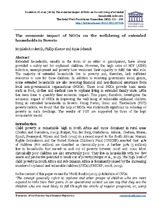The economic impact of NGOs on the well-being of extended households in Soweto
Abstract
Extended households, usually in the form of an elder or grandparent, have always
provided a safety net for orphaned children. However, the high rates of HIV (AIDS)
infection, unemployment and poverty have weakened their capacity to fulfil this vital role.
The majority of extended households live in poverty and, therefore, lack sufficient
resources to care for these children. In addition to receiving government social grants,
some extended households are also receiving financial and non-financial assistance from
local non-governmental organisations (NGOs). These local NGOs provide basic needs
such as food, clothes and medical care to orphans living in extended family units. Little
has been done to quantify their economic impact. This paper, therefore, investigates the
economic impact of NGOs in improving the well-being of vulnerable orphaned children
living in extended households in Soweto. Using Foster, Greer and Thorbecke’s (FGT)
poverty indices, we found that the help of NGOs was statistically significant in reducing
the level and extent of poverty in such dwellings. The results of FGT are supported by
those of the logit econometric model.

